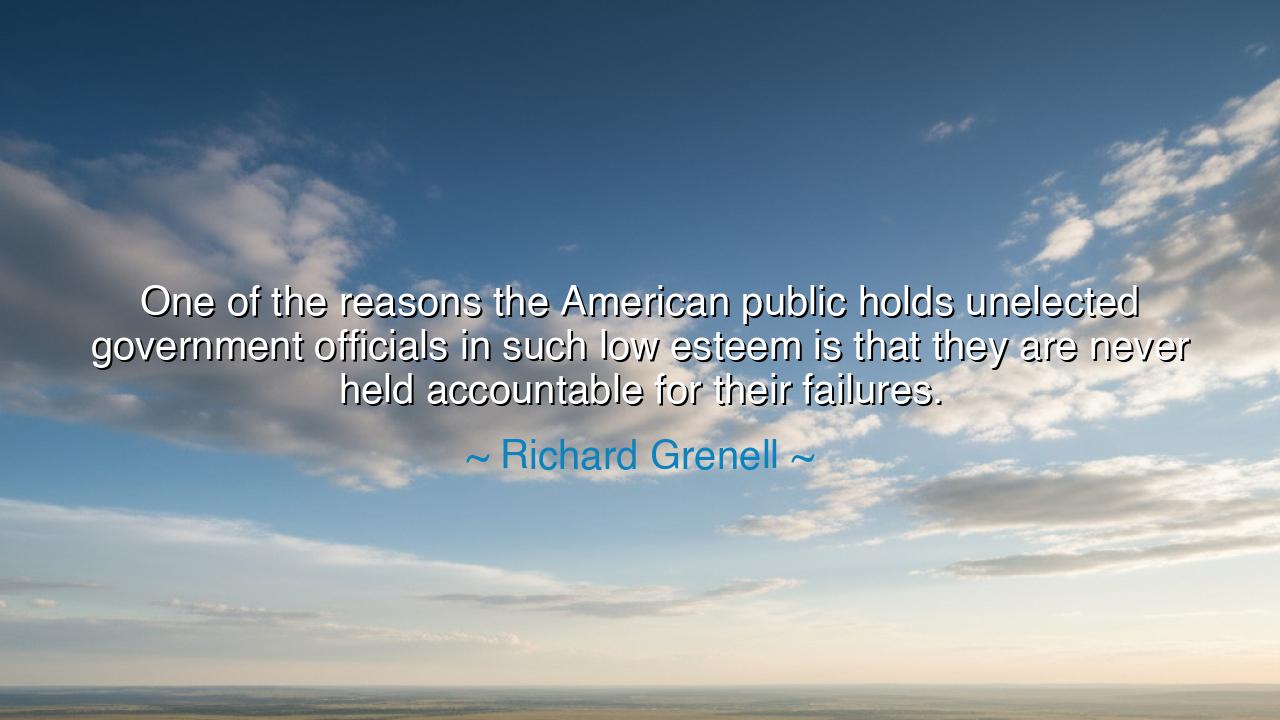
One of the reasons the American public holds unelected government
One of the reasons the American public holds unelected government officials in such low esteem is that they are never held accountable for their failures.






In a tone both stern and sorrowful, Richard Grenell, a man of diplomacy and conviction, once spoke these piercing words: “One of the reasons the American public holds unelected government officials in such low esteem is that they are never held accountable for their failures.” His declaration cuts through the veil of bureaucracy and strikes at the heart of a truth long known yet too often ignored: that power without responsibility corrupts the very soul of governance. For when those who wield authority face no judgment for their mistakes, the bond between ruler and people begins to rot, and the trust that sustains a republic withers away like a tree stripped of its roots.
To understand the meaning of this quote, one must first behold the nature of accountability. In every healthy society, justice demands balance—between authority and humility, between decision and consequence. The unelected official, though unseen by most, wields immense power over the lives of citizens: crafting regulations, enforcing laws, and shaping policies that define nations. Yet unlike elected leaders, these individuals often operate behind walls of secrecy and procedure, shielded from the light of public scrutiny. When they fail—through neglect, arrogance, or error—the cost is borne not by them, but by the people. And so, Grenell reminds us, contempt for bureaucracy is not born of ignorance, but of betrayal.
The origin of this sentiment lies deep in the history of democratic struggle. From the earliest days of the American Republic, the Founding Fathers feared not only the tyranny of kings, but the tyranny of unaccountable power in any form. Thomas Jefferson once warned that the price of liberty is eternal vigilance—not only against foreign foes, but against the creeping expansion of authority within. The rise of bureaucratic power—vast, unelected, and entrenched—was seen by many as the slow erosion of that vigilance. Grenell’s warning, therefore, is not new, but ancient: it is the cry of those who understand that government, once divorced from accountability, ceases to be the servant of the people and becomes their master instead.
History offers vivid examples of what happens when the unaccountable rise unchecked. In the twilight years of the Roman Empire, senators and officials—unelected by the people, answerable only to one another—amassed privilege and wealth while the common citizens languished. Decisions were made in secret; failures were buried beneath layers of excuses. When the Empire finally collapsed, it was not only from barbarian invasion, but from the rot of internal corruption and the indifference of those who governed without answer to those they governed. The lesson of Rome whispers across centuries: that when the people lose faith in their institutions, even the mightiest empire can crumble into dust.
In modern times, this pattern repeats in quieter, subtler forms. When governments grow vast and opaque, when decisions are made by bureaucrats rather than representatives, citizens feel alienated from the power that shapes their lives. Scandals go unpunished; incompetence is rewarded with promotion rather than accountability. Grenell’s warning is not a condemnation of government itself—it is a call to purify it. He urges us to remember that authority must always be answerable to those it serves, for accountability is the lifeblood of democracy. Without it, even good intentions curdle into arrogance, and noble causes are reduced to self-preserving systems that care more for their own survival than for the welfare of the people.
Yet there is also wisdom in restraint. For accountability must not become vengeance. The purpose of judgment is not destruction, but correction—to restore balance where it has been lost. Just as a craftsman sharpens his tools to keep them effective, so must a nation refine its systems of power to keep them just. The unelected official, though not chosen by the ballot, must still serve under the shadow of responsibility—to law, to conscience, and to the public trust. To demand less is to invite decay; to demand more is to sustain liberty itself.
Therefore, my children of democracy, learn from Richard Grenell’s warning. Do not allow your institutions to drift into complacency. Do not confuse authority with wisdom, or position with virtue. Demand transparency from those who rule, even the unseen ones. Ask not only what laws are made, but who enforces them, and with what accountability. For freedom is not protected by elections alone—it is guarded by vigilance, by the courage to question, and by the insistence that all who hold power, whether chosen or appointed, must answer for their deeds.
And so remember: accountability is the soul of democracy. When power hides from consequence, liberty dies. But when power humbles itself before the people, when even the highest official stands equal before justice, then the promise of freedom lives anew. Let this truth guide your hearts and your governance—that responsibility is not a burden to be feared, but the crown of all who serve with honor. For a government that embraces accountability does not merely rule—it leads, with integrity, courage, and light.






AAdministratorAdministrator
Welcome, honored guests. Please leave a comment, we will respond soon